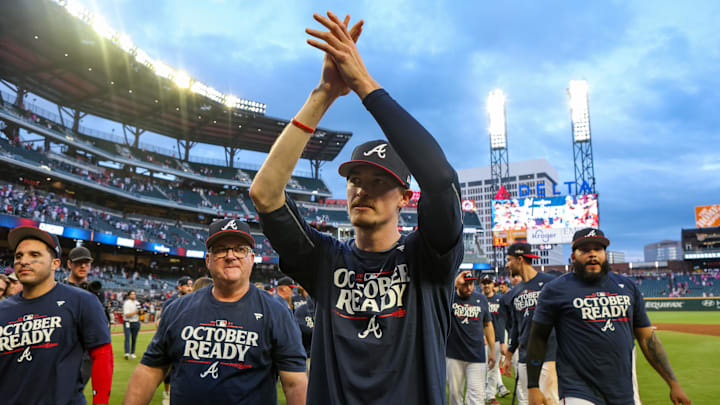The Braves will make Max Fried a qualifying offer (QO) worth $21.05M, he’ll reject it, and after he signs elsewhere the Braves get a compensation pick in the 2025 draft. If they sign a player who refused a QO, they face penalties that make the draft pick a joke.
"The camel was an example of a horse designed by a committee." - Alec Issigonis and others.
MLB’s Qualifying Offer looks like that proverbial horse. The principle is simple: A team losing a valuable player to free agency should receive compensation.
However, all teams choosing not to sign a star player aren’t equal, so all compensation can’t be equal; for clubs paying the competitive balance tax, it’s no more than an opportunity to buy one or more $1M lottery scratch-off tickets.
The level of compensation depends on the team’s annual payroll and Competitive Balance status. If a team's QO player signs for:
- At least $50M, the revenue-sharing team gets a pick immediately after the first round of the next draft.
- Less than $50M gives a revenue-sharing team, or a team that doesn’t receive revenue-sharing and doesn’t pay the CBT gets a pick between Competitive Balance Round B after the second round, somewhere between pick 70 and 80.
- CBT payors receive a pick pick after the fourth round - picks between 130 and 140.
The Braves are projected to pay the CBT. If they sign a free agent with a QO attached:
- They forfeit $1M of their international bonus pool money, and
- Lose their second and fifth-highest draft picks.
If they signed a second player with a QO attached, they would also lose their third and sixth-highest picks.
How the qualifying offer will determine the Atlanta Braves offseason decision making
Everyone wants the Atlanta Braves to improve the offense at short and in left, and the Braves may look to add a veteran starter after Charlie Morton's expected retirement, but how do they do that?
The Braves were never going to play in the Juan Soto and Corbin Burnes end of the free-agent pool, and those fans clamoring for the team to sign Willy Adames will have a disappointing offseason.
The Braves aren’t likely to do that because he’ll want the same contract with a higher AAV that they refused to give Dansby Swanson, and other teams will.
Contract preferences aside, the Braves are CBT payors this yet, meaning that signing any free agent with a QO attached will result in losing their second-round pick, their fifth-round pick, the slot money for those picks, and $1M from their international signing pool.
The pick awarded for Fried's loss comes after the fourth round. It comes with slot money—in 2024, those picks received between $400K and $500K —and essentially offsets the loss of the fifth-round pick.
Alex Anthopoulos likes to buy under-slot prospects to pay more for players that have a high upside. While prospects are only prospects, losing our second and fifth picks in the draft and the slot money that goes with them affects how he spends on the picks they make,
forfeiting the international bonus pool dollars further reduces their chance to improve a thin minor league system.
External options for the Braves offseason that won't come with a qualifying offer attached
Atlanta is likely to look at players who were good but not hot enough to receive a QO. Before his flexor tendon surgery, Nico Hoerner looked like the best trade candidate, but he’ll miss most of next year.
Amed Rosario’s name came up when he was with Cleveland. He’s a free agent this year, but his defense doesn’t look good enough to make him viable.
Tommy Edman saved the Dodgers when Rojas went down, and I don’t expect them to go deep enough to get Adames when Edman looks like he’s doing the job. No one in their right mind wants Correa’s albatross contract. J.P. Crawford’s bat was as bad as Arcia’s without the defense.
Tommy Edman leads all players with 19 hits this #Postseason 🔥
— MLB Network (@MLBNetwork) October 28, 2024
Ron Darling discusses Edman's impact on the @Dodgers and compares him to a former World Series MVP 👀#MLBTonight | @LGRed pic.twitter.com/AENbCAn5od
A healthy Ha-Seong Kim would look for a multiyear deal, but he has an $8M mutual option with a $2M buyout and could exercise it and try again next year if the Padres pick up their end. If that doesn't happen, the Braves could take a flyer in him to return mid-year.
The Kelenic experiment looks like a flop, so the Braves could use a left-handed bat, and Jesse Winker, for three at $24M, looks like an affordable platoon partner for Ramon Laureano. Trading for someone like Jesús Sánchez from Miami is also an option. Both are better than throwing money at Jurickson Profar.
Help in the form of 150 innings on the bump at the back of the rotation could come in the form of a trade for a year of Zack Littell, two years of Jameson Taillon, or signing someone like Luis Severino or Yusei Kikuchi who won’t have a QO attached.
Alex Anthopoulos said the Braves will increase payroll, something that had to happen because of raises to arbitration-eligible players and the need to fill vacancies on the roster. We’ve seen the draft save the season over the last two years, and losing the slot money makes it's hard to see him punting draft picks and international signing pool money for an aging free agent with a QO attached.
He’s always looked to add value through trades and adding players looking for a comeback season, and there’s no reason to believe he’s going to change. So, if you’re pining for Adames, Burnes, or Teoscar, I think you will have a disappointing offseason.
